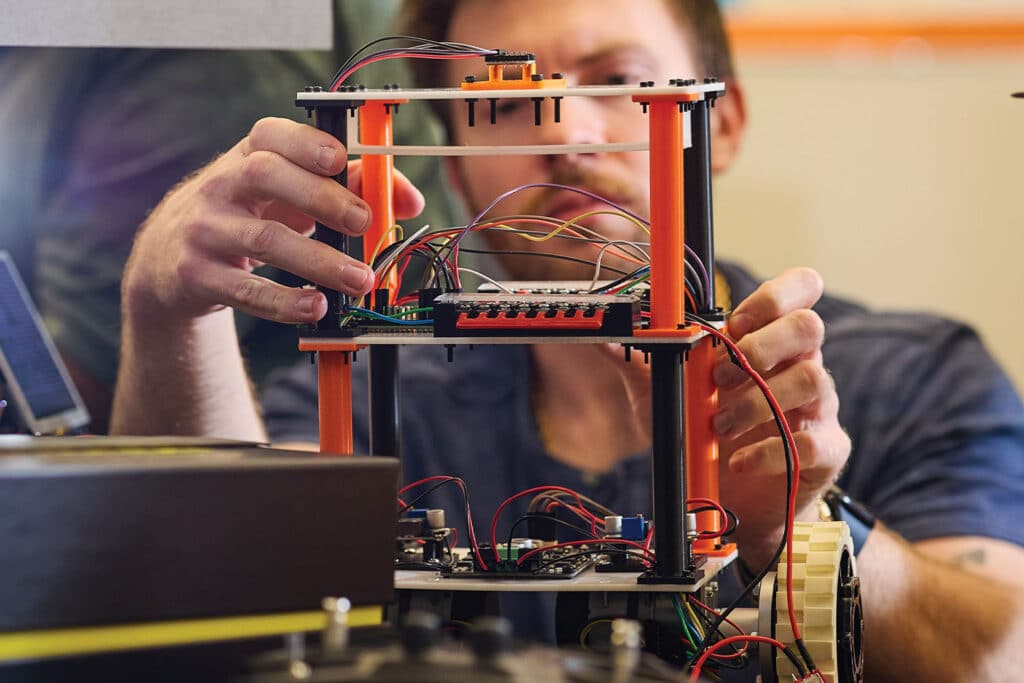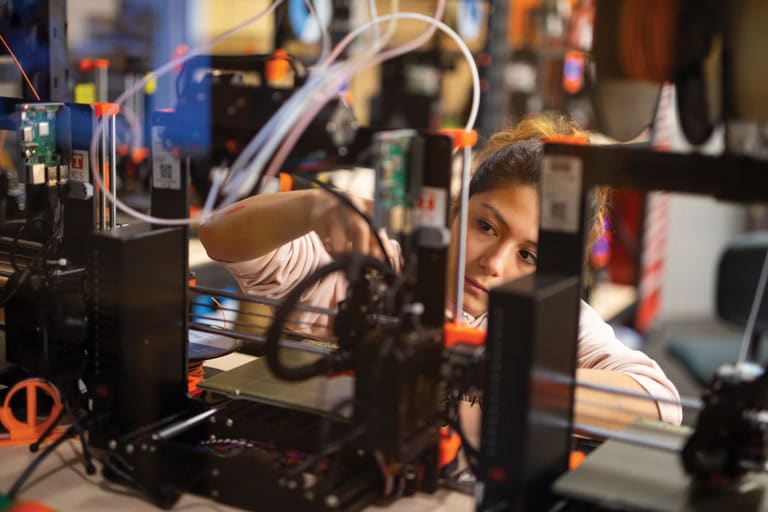
Computer Engineering, BS
Build the foundation of future technology by obtaining a BS in computer engineering. This fast-growing field enables problem solvers to take on complex technical challenges by coming up with creative solutions. With engaging coursework and state-of-the-art facilities, our program can set you up for a fulfilling career in computer engineering.
Program overview
As a part of the largest department in the Tickle College of Engineering, the computer engineering program provides students with rigorous curriculum to prepare them for their future profession while also offering flexibility to choose courses that match their interests. During their time in our program, computer engineering students have access to state-of-the-art software and equipment to hone their skills. With a diverse network of industry partners and award-winning faculty, our students gain comprehensive knowledge and essential experience in computer engineering.
Becoming a computer engineer opens the door to a versatile field where you can specialize in various areas, including:
- Operating systems
- Artificial intelligence
- Robotics
- Hardware systems
- Embedded systems
Why Study Computer Engineering?
As you study for a BS in computer engineering, you’ll gain creative problem-solving skills to face the rising challenges of technology while also interpreting analytics and implementing your solutions.
What is computer engineering?
Computer engineering is a field where computer science and electrical engineering meet, combining the design and development of hardware and software systems. When computer engineers design hardware, they create processors for various systems, like smartphones, computers, vehicles, etc. If they specialize in software, computer engineers learn programming languages to write code for programs or apps.
What is the difference between computer engineering and computer science?
Computer engineering and computer science are closely related, but they have key differences. While both disciplines require problem solving and technical expertise, computer science typically focuses on theorizing and developing software to solve problems. Computer engineering involves designing hardware and computers; it includes programming skills, but the main focus is more along the lines of electrical engineering and physics.
What can you do with a BS in Computer Engineering after graduation?
When you get your Computer Engineering, BS from UT, you become a part of the distinguished group of EECS alumni. Our former students have been employed by world-renown companies, like Oak Ridge National Laboratory, Eastman, and Electric Power Research Institute. And, if you’re wondering what a computer engineer salary looks like, recent data shows that the annual average salary is greater than $81,000.
Upon graduation, there are numerous paths you can take as a computer engineer. Some industries to work in include:
- Automotive
- Computing
- Aerospace
- Healthcare
- Manufacturing
Featured Courses
Typically, a computer engineering curriculum provides a background in three broad areas—hardware, software, and hardware-software integration. Students will also have the opportunity to explore fundamental topics such as microprocessors, computer architecture, digital signal processing, embedded systems, operating systems, network architectures, data communications, cybersecurity, and other related material. In addition, the program includes core engineering subjects that are common to all engineering disciplines. Explore the campus catalog for more information about the curriculum.
ECE 201 Circuits I
Circuits I is a course where students learn about the fundamental laws of circuit analysis, including Ohm’s Law and Kirchhoff’s current and volage laws.
ECE 256 Computer System Interfaces
In this computer engineering course, students are introduced to the design, implementation, and testing of interfaces used in modern computing systems.
ECE 335 Electronic Devices
This class includes learning about semiconductor physics, modeling of diode and transistor devices, and designing diode switching and rectifier circuits.
ECE 356 Computer Systems Architecture
Students will learn about the architecture and design of microcomputer systems with microprocessors or microcontrollers.
Complementary minors
To make yourself more marketable in your future career, you could add a minor to your BS in computer engineering. Look at this list of complementary minors:
Admissions and Aid
Choosing the right university to pursue an engineering degree is an important decision—and a significant investment. We want to make sure that you have the information you need to both apply and make attending UT affordable.


Ready to Join Us?
See yourself on Rocky Top? We’ve made it easier than ever to apply for admission. Learn more about our admission requirements and the steps to apply to be an Engineering Vol.
